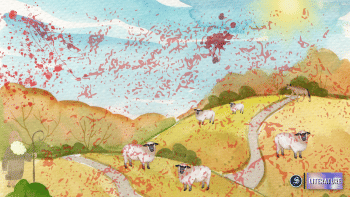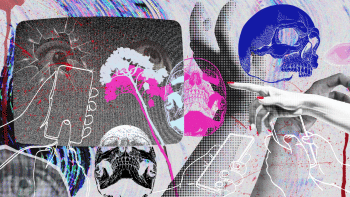The loss of essentiality

Umar stood in line with all the patience in the world. He could smell the anxiety and fear in the air. The room was filled with people once glorifying death and taking pride in solitude, now filled with panic in the face of reality.
The government declared the new amendment 11 months 28 days ago. It stated a new elimination method to deal with the overpopulation. It came after months of discussion among an elite panel of intellectuals who reached the unanimous decision that it would be best to let go of the anti-social elements of our society.
For survival, each citizen above the age of 18 would need to submit certificates of socialisation attested by at least five different citizens, excluding near or distant family members. They can be friends, colleagues, classmates or anyone who thinks you're valuable enough. But every citizen could only give away four such certificates, making their attestations extremely valuable. This made such certificates the most valuable commodity in the country.
"Well, I got an offer of five million from my manager", Rukhsana sighed, "I took the offer. Look, Umar, it's October now. Nobody's got their certificates left! You should've asked me earlier. Of course, I'd have saved the last one for you."
The rich anti-socials could, of course, buy their way out of it. Attestations were being sold for millions. But for the poor social outcasts, survival was a race against time. One couldn't just go ahead and start socialising for 10 months with someone, only to demand a certificate in November. Soon enough, a black market rose where fake certificates were being sold at slightly lower prices. The entire process was foolproof and heavily scrutinised by the state and any event of getting caught with fake certificates would mean death. But by December, the anti-socials were desperate to try out anything.
When the amendment was declared in early January, Umar thought he'd easily survive. Sure, he was a bit quiet but there was no way there weren't five people in this world who wouldn't vouch for him. He gave away all four of his certificates by the end of March: two to his friends–Khalid and Zubair, one to his maid–Ratna, and another to his neighbour–Mr Zunaid. The obvious approach would be to ask them to vouch for him in return but Khalid and Zubair had their reasons. Each of them had one certificate left in April when Umar finally asked them. Khalid had been in a relationship for four years then and Zubair had recently taken a lover, so it was obvious that they'd save their last certificate for their girlfriends.
"Hridita is still looking for someone else to vouch for her", Zubair reassured Umar, "I'll let you know in a month or two. I'm trying my best to save the last one for you, Umar. Don't you worry! Hridita is a social girl, she'll find someone and you can take my last one then."
But that was the problem. Over the last year, people started to realise how much they overestimated their essentiality. Sure, they had friends but their friendships were only valued by their presence in a situation. Their presence was appreciated but not imperative to anyone. Their absence didn't create a vacuum anywhere and would barely put a dent in the lives around them. They were present but not present enough for someone to miss their non-existence. It was harder for these people to accept the reality than for someone like Umar who was always in acceptance of his insignificance.
But even then, Umar was confident of the few relations he had. Apart from Khalid and Zubair, there was Rukhsana. Since Rukhsana wasn't officially his wife anymore after their divorce last year, she could lawfully vouch for him. Umar was quiet, boring and unexciting as a husband. That may be reason enough to cheat on your husband but clearly not enough to let him die.
"Umar, I can't", she said after a long pause, "I gave two to my friends and another one to Ashfaque."
"Which still leaves you with one", Umar tried to pretend he didn't hear Ashfaque's name.
"Well, I got an offer of five million from my manager", Rukhsana sighed, "I took the offer. Look, Umar, it's October now. Nobody's got their certificates left! You should've asked me earlier. Of course, I'd have saved the last one for you."
Umar couldn't get Ashfaque's name out of his head. He had managed to get three by then–Ratna, Mr Zunaid and one he'd won in a promotional contest for a restaurant, back in May. Soon, it was November and a nationwide panic arose. Curfews and blockades made movement restricted and the police were getting less and less tolerant of the protestors. Shooting people was no longer a cause for debate since people were the problem, to begin with. Kidnappings, robbery, hostage situations–certificates were the new currency of negotiation. The population was already decreasing owing to all the suicides, murders and shootings and the per capita income rose like never before. The government could do nothing but wait for December 31, after which all certificates issued would be null and void.
"Shut off the gates!" a voice shouted from inside. Men in bomber jackets started battering the crowd away from the gates, while guards closed the tall metal gates. Three days before New Year's, people couldn't care less about getting beaten up. Umar was thrown under the raging crowd as people behind him started running over him and up front. While some were busy bludgeoning the guards and smashing their skulls in with whatever they could find, others kept pushing the giant metal gate, barely putting a dent on the steel structure.
When Umar regained his consciousness hours later, the field was all quiet. There were a few wails in the distance, soon-to-be corpses looking for corpses of their loved ones. It was just before dawn. People will start forming queues for the next day in a few hours. The cleaners kept sweeping away the bodies into the truck, throwing bleach all across the floor.
Umar saw a man stand up from a heap of bodies in the distance. Head already bludgeoned in and portions of his brain pouring out, the man wiped the blood on his face and limped to the front of the gate. Two days left before New Year's; he couldn't waste any more time.
Hasib Ur Rashid Ifti is a writer who is currently a student of Bangladesh University of Engineering and Technology.

 For all latest news, follow The Daily Star's Google News channel.
For all latest news, follow The Daily Star's Google News channel. 









Comments